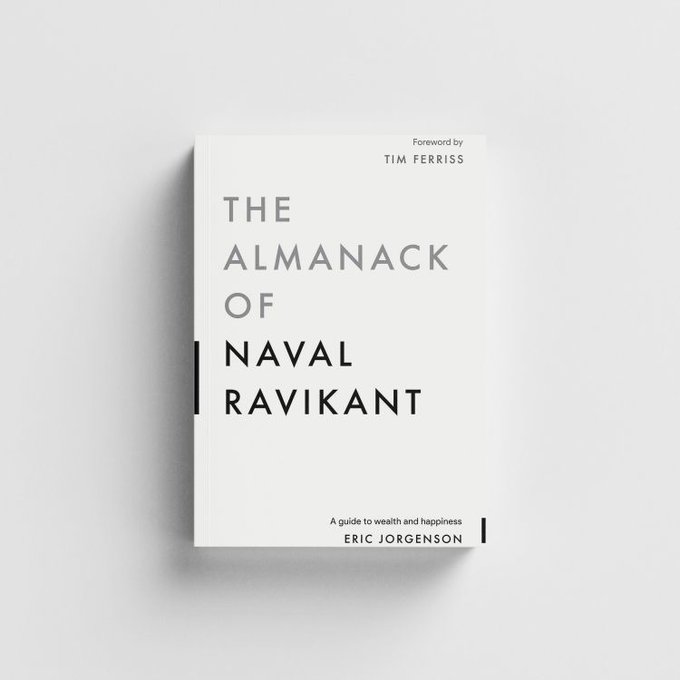Naval Ravikant is an Indian-American entrepreneur and investor. He is the co-founder, chairman, and former CEO of AngelList.[2] He has invested early-stage in over 200 companies including Uber, FourSquare, Twitter, Wish.com, Poshmark, Postmates, Thumbtack, Notion, SnapLogic, Opendoor, Clubhouse, Stack Overflow, Bolt, OpenDNS, Yammer, and Clearview AI, with over 70 total exits and more than 10 Unicorn companies. (Wikipedia)
He is also famous for writing great Twitter threads, the most famous of them being this one. Read the actual tweet here.
Here are Timeless Lessons From The Almanack of Naval Ravikant.
1. Wealth vs Money vs Status
Seek wealth, not money or status. Wealth is having assets that earn while you sleep. Money is how we transfer time and wealth. Status is your place in the social hierarchy.
Ethical Wealth
Understand that ethical wealth creation is possible. If you secretly despise wealth, it will elude you.
What should you avoid?
- Ignore people playing status games. They gain status by attacking people playing wealth creation games.
- You’re not going to get rich renting out your time. You must own equity — a piece of a business — to gain your financial freedom.
2. Wealth Creation
Becoming wealthy is a learnable skill. Creating wealth is more important than a status symbol. Money is a tool that you exchange for products and services. To create wealth, provide value to society. Something society needs, but it doesn’t know it yet. Provide at scale. Internet is the best way to do it.
3. Specific Knowledge
Arm yourself with a specific knowledge that makes you unique. This knowledge can’t be trained for in schools. If it can be trained, you will be replaceable. Knowledge is learned through failures and experiences. This sets you apart from the competition. Specific knowledge is found by pursuing your genuine curiosity and passion rather than whatever is hot right now. Building specific knowledge will feel like play to you but will look like work to others. When specific knowledge is taught, it’s through apprenticeships, not schools. Specific knowledge is often highly technical or creative. It cannot be outsourced or automated.
4. Leverage
It is hard to create wealth having a 9-5. You will never be rich renting time. Time is a limited commodity. Use leverage (labor, assets, money) to amplify your efforts. Ownership of assets is the leverage to build wealth and increase earning potential.
Learn Foundational Skills:
Leverage is a force multiplier* for your judgment. Judgment requires experience but can be built faster by learning foundational skills. There is no skill called “business.” Avoid business magazines and business classes. Study microeconomics, game theory, psychology, persuasion, ethics, mathematics, and computers. Reading is faster than listening. Doing is faster than watching.
5. Play Long-Term Games With Long-Term People
Compounding works in relationships, businesses, or money. You won’t be successful overnight. Keep working on these important things that take time. You’re trying to succeed over years and decades, not just in days or weeks.
6. Play To You and Work For Others
Find what you love to do and you will enjoy it. When you are passionate about something, it is not a job anymore, it is a necessity. What may seem hard to others is a delight and a source of motivation. What’s that thing for you?
7. Life is a Single-Player Game
We do things in life to get validation from our parents and society. The reality is that you were born alone and are going to die alone. Your interpretations and memories are alone. Before you showed up, nobody cared. It’s all single-player.
8. Aspirational Personal Hourly Rate
Set and enforce an aspirational personal hourly rate. If fixing a problem will save less than your hourly rate, ignore it. If outsourcing a task will cost less than your hourly rate, outsource it. Even if you cannot do it right away, have a goal to do it in the future.
9. Freedom
The number one reason people want to become wealthy is to be free. The freedom is to have control of your time, unlike a 9–5. Freedom shifts from “freedom to” to “freedom from.” Freedom is internal. It’s freedom from reaction, feeling angry, and being sad.
What are some of your Timeless Lessons From The Almanack of Naval Ravikant? Share in the comments below.



